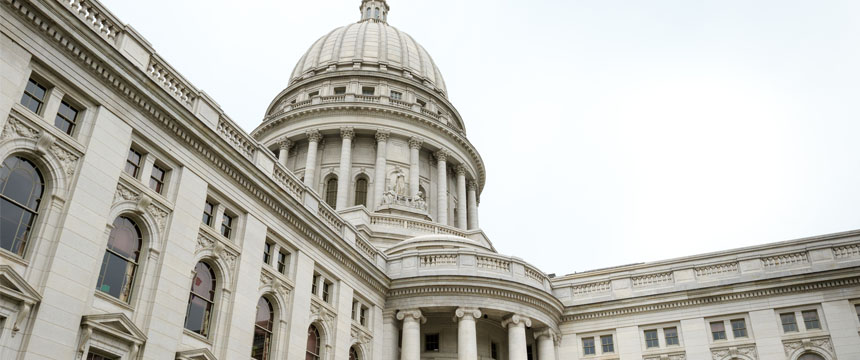
Update as of Thursday, April 16, 2020
With Wisconsin’s initial Safer-at-Home Order scheduled to expire next week, Wisconsin has issued a new Emergency Order extending most of the restrictions through May 26. The governor’s office has also issued an FAQ describing the changes.
Most of the terms from the original order remain unchanged. However, there are a handful of new or updated terms that will be of interest to Wisconsin employers.
“Safe Business Practices”
While the list of “essential businesses” is unchanged, Section 2.b of the new order identifies a number of “Safe Business Practices” that essential businesses must comply with, including:
- Restrict the number of workers present on premises to no more than is strictly necessary to perform the essential operation.
- Increase standards of facility cleaning and disinfection to limit worker and patron exposure to COVID-19, as well as adopting protocols to clean and disinfect in the event of a positive COVID-19 case in the workplace.
- Adopt policies to prevent workers from entering the premises if they display respiratory symptoms or have had contact with a person with a confirmed diagnosis of COVID-19.
Additional “Safe Business Practices” for Public Facing Businesses
In addition to the above requirements, businesses that “remain open for in-person sales” must take a number of additional steps:
- Consider establishing curbside pick-up to reduce in-store traffic and mitigate outdoor lines.
- For stores with less than 50,000 square feet of customer floor space, limit the number of people in the store (including employees) to 25% of the total occupancy limits established by the local municipality.
- For stores of more than 50,000 square feet:
- Limit the number of customers in the store at one time (excluding employees) to four people per 1,000 square feet of customer floor space.
- Offer at least two hours per week of dedicated shopping time for vulnerable populations, which for purposes of this Order are people over 60, pregnant women, and those with chronic conditions like heart disease, diabetes, and lung disease.
- Establish lines to regulate entry in accordance with occupancy restrictions with markings for patrons to enable them to stand at least six feet apart from one another while waiting. Stores should also use alternatives to lines, including allowing customers to wait in their cars for a text message or phone call and scheduling pick-ups or entries to the store.
Additional Restrictions on Suppliers of Essential Businesses
For companies that supply both essential and non-essential businesses with necessary services, equipment, or supplies, Sections 13.r and 13.v of the new order specify that they may only continue full operations as far as necessary to support the essential businesses they supply. Thus, suppliers will need to determine which among their customers are essential.
Expansion of “Minimum Basic Operations”
Non-essential businesses continue to be limited to performing only “minimum basic operations” during this time. However, Section 14 of the new order does provide some relief to these businesses, in the form of expanding what constitutes “minimum basic operations.”
- Minimum Basic Operations may include fulfilling nonessential deliveries, mailing parcels, or receiving parcels if all of the operations are performed by one person in a room or confined space, including a car or truck.
- Minimum Basic Operations may include curb-side pick-up of goods, if all of the operations are performed by one person in a room or confined space at a time, including a car or truck. Goods must be purchased online or by phone before pick-up. The goods must be pre-packaged by the manufacturer, distributor, or store.
- Non-essential businesses performing minimum basic operations must determine which of their workers are necessary to conduct Minimum Basic Operations and inform such workers of that designation.
Limited Exception for “Arts and Craft Stores” for Sale of Personal Protective Equipment Materials
Arts and craft stores may offer curb-side pick-up. More than one staff member, but no more than the minimum number of staff necessary, may work at the store solely for filling orders for materials for making personal protective equipment (i.e. homemade facemasks). The additional staff allowed in this section may not sell, package, or assist in any way with the sale of items not necessary for making personal protective equipment.
Limited Exception for Landscaping Work
Minimum Basic Operations may include aesthetic or optional exterior residential construction and lawn care, if all the operations are performed by one person in a room or confined space, including a car or truck. No more than one employee or worker may be on the site at a time. Services may not require a signature by the recipient. Aesthetic or optional exterior work requiring more than one person on the site are prohibited.
School’s Out for Summer
Schools are officially to remain closed for the remainder of the 2019-20 school year.
Violations of the order continue to be punishable by fines and imprisonment. All Wisconsin employers should review these changes carefully to ensure they remain in compliance with the state order.
Information as of March 24
Earlier today, Wisconsin Governor Tony Evers entered a Safer at Home Order.The Order requires the closure of all businesses throughout the state except those deemed “Essential Businesses and Operations.” For those businesses deemed “Essential,” the Order further outlines the protections they must put in place during this period.
The order goes into effect at 8:00 a.m. on Wednesday, March 25, 2020 and will remain in place until April 24 or until superseded by a further order.
The Order directs “All individuals present within the State of Wisconsin are ordered to stay at home or at their place of residence,” except as provided in a set of exceptions.For work purposes, individuals are allowed to leave the home only to operate “Essential Businesses and Operations” or in very narrow circumstances for non-essential businesses (see below). Further, the Order urges the elderly, the sick, and those with underlying health conditions “to stay in their home or residence to the extent possible except as necessary to seek medical care.”
The Order defines “Essential Businesses and Operations” following the lead of other states, the Order identifies as “essential” the industries identified as “critical infrastructure sectors” by the U.S. Cybersecurity and Infrastructure Security Agency.These industries include:
- Health Care / Public Health
- Law Enforcement, Public Safety, First Responders
- Food and Agriculture
- Energy
- Water and Wastewater
- Transportation and Logistics
- Public Works
- Critical Manufacturing
- Hazardous Materials
- Financial Services
- Chemical
- Defense Industrial Base
In addition, the order expressly identifies as “essential” the following businesses:
- Healthcare and public health operations
- Essential infrastructure, including construction
- Stores that sell groceries and medicine
- Food and beverage production, transport, and agriculture
- Restaurants (but only takeout and delivery)
- Child care (with directions to prioritize children of health care workers)
- Charitable and social services organizations
- Weddings, funerals, and religious entities (subject to a 10-person maximum)
- Media
- Gas stations, transportation sales, and transportation repair
- Financial institutions and services
- Hardware and supply stores
- Critical trades (“including but not limited to plumbers, electricians, carpenters, laborers, sheet metal, iron workers, masonry, pipe trades, fabricators, finishers, exterminators, pesticide application, cleaning and janitorial staff for commercial and governmental properties, security staff, operating engineers, HVAC, painting, moving and relocation services, forestry and arborists”)
- Mail, post, shipping, logistics, delivery, and pick-up services
- Laundry services
- Supplies to work from home
- Transportation
- Home-based care and services
- Professional services, with a requirement that these businesses “shall, to the greatest extent possible, use technology to avoid meeting in person, including virtual meetings, teleconference, and remote work (i.e., work from home).”
- Critical labor union functions
- Hotels and motels
- Higher educational institutions
In addition to these exceptions, there are a number of broad catch-all exceptions:
- “[O]ther service providers who provide services that are necessary to maintaining the safety, sanitation, and essential operation of residences, Essential Activities, Essential Governmental Functions, and Essential Businesses and Operations.”
- “Businesses that sell, manufacture, or supply other Essential Businesses and Operations and Essential Governmental Functions with the support or supplies necessary to operate, including computers; audio and video electronics; household appliances; IT and telecommunication equipment; hardware; paint; flat glass; electrical, plumbing, and heating materials; construction materials and equipment; sanitary equipment; personal hygiene products; food, food additives, ingredients, and components; medical and orthopedic equipment; firearm and ammunition suppliers and retailers for purposes of safety and security; optics and photography equipment; diagnostic; food and beverages; chemicals; paper and paper products; soaps and detergents.”
- “Manufacturing companies, distributors, and supply chain companies producing and supplying essential products and services in and for industries such as pharmaceutical, technology, biotechnology, healthcare, chemicals and sanitation, waste pickup and disposal, agriculture, food and beverage, transportation, energy, steel and steel products, petroleum and fuel, mining, construction, national defense, communications, and products used by other Essential Governmental Functions and Essential Businesses and Operations.”
Finally, the Order provides employers with the ability to request to be named an “Essential Business” if not covered by one of the many exceptions above.The Order links to a website that purports to provide further details and a method to request designation as an “Essential Business.” (As of this writing, the website is not functional.)
For businesses that are allowed to remain open, the Order nevertheless directs them “to the greatest extent possible, use technology to avoid meeting in person, including virtual meetings, teleconference, and remote work (i.e., work from home).”
Businesses deemed “non-essential” are allowed to perform only “Minimum Basic Operations” at this time.“Minimum Basic Operations” are two-fold:
- “The Minimum necessary activities to maintain the value of the business’s inventory, preserve the condition of the business’s physical plant and equipment, ensure security, process payroll and employee benefits, or for related functions” and
- “The minimum necessary activities to facilitate employees of the business being able to continue to work remotely from their residences.”
In addition to the Wisconsin Order, the Milwaukee Health Department issued a separate stay-at-home order yesterday evening. Though the current terms of the two orders vary, the Mayor’s office has confirmed Milwaukee will amend its order to match the terms of the Wisconsin Order.
For more information about recommended steps, please contact your Foley relationship partner. For additional web-based resources available to assist you in monitoring the spread of the coronavirus on a global basis, you may wish to visit the CDC and the World Health Organization.
Foley will continue to keep you apprised of relevant developments. Click here for Foley’s Coronavirus Resource Center for insights and resources to support your business during this challenging time. To receive this content directly in your inbox, click here and submit the form.
